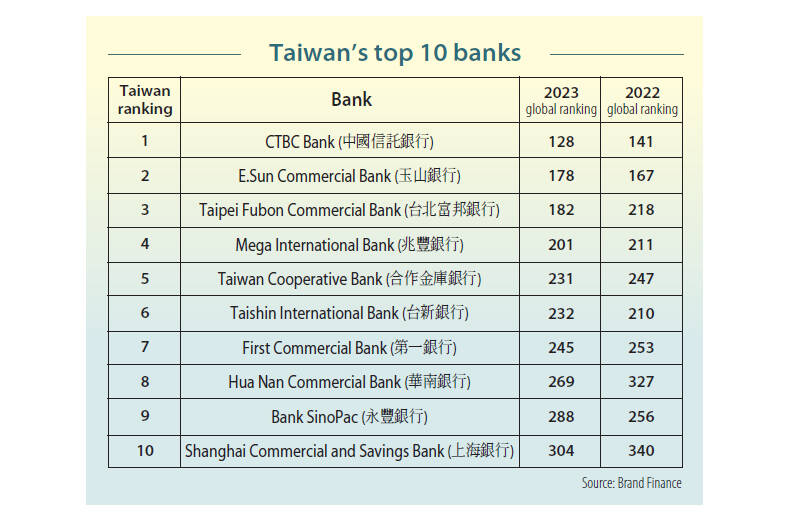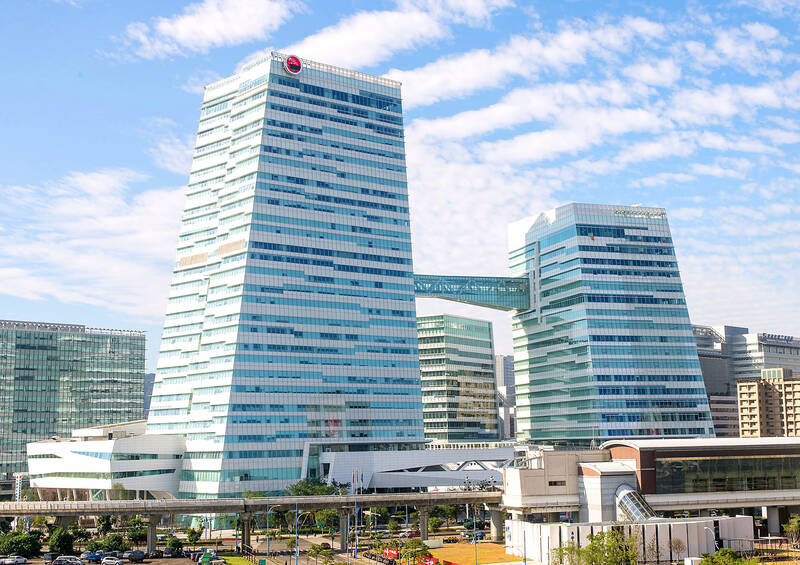CTBC Bank (中國信託銀行) was ranked the world’s 128th most valuable bank in the Brand Finance Banking 500 report this year, the ninth time the bank was listed as the highest-rated Taiwanese financial institution in the brand valuation consultancy’s listing.
According to the report — created jointly by the consultancy and The Banker magazine, both of which are based in the UK — CTBC Bank has a brand value of US$2.112 million, which advanced its placement in the listing by 13 places from last year.
The report also listed CTBC Bank’s brand strength index as the 41st highest globally, up 58 ranks from the bank’s placement the previous year.

Regarded as the industry’s most authoritative report of its kind, the Brand Finance Banking 500 report gauges the brand value of the world’s financial institutions through quantitative and qualitative metrics, including brand strength, brand royalty rate and revenue forecasts.
CTBC Bank’s 28 percent year-on-year increase in brand value is due largely to a stable financial performance that contributed to steady growth, while the bank’s brand strength index score of 83 reflected its “AAA-” credit rating, the report said.
CTBC Bank is Taiwan’s only financial institution to be included in the report’s top 50 ranking for brand strength.

Photo courtesy of CTBC Bank Co
The bank’s brand royalty rating — a gauge of its value and influence on profits — rose to 3.7 percent, representing a 0.4 percentage point increase over last year, which suggests sound performance in operational effectiveness, financial services and client satisfaction.
CTBC Bank is the Taiwanese financial institution with the furthest international reach and has a strong presence throughout Southeast Asia.
It operates branches in Singapore, India and Vietnam, subsidiaries in Indonesia and the Philippines, offices in Malaysia and Myanmar, and since 2020 has been the largest shareholder of the Thailand-based LH Financial Group.
Demonstrating its status as a regionally significant financial institution, CTBC Bank participates in the government’s New Southbound Policy, conducting a wide range of overseas operations to facilitate Taiwanese investments there.
Last year, CTBC Bank won 290 domestic and international awards including all seven of the Taiwan Banking and Best Practice Awards, 41 Asia Pacific and global awards, its seventh Best Taiwan Global Brands award and its eighth World Branding Forum Brand of the Year award, the sole Taiwanese financial institution to hold that distinction.
Additionally, CTBC Bank is the only Domestic Systemically Important Bank to exceed all three capital requirement metrics for 2025 and its “A1” rating from Moody’s shows the bank to be the most robust financial institution in the nation.

Intel Corp chief executive officer Lip-Bu Tan (陳立武) is expected to meet with Taiwanese suppliers next month in conjunction with the opening of the Computex Taipei trade show, supply chain sources said on Monday. The visit, the first for Tan to Taiwan since assuming his new post last month, would be aimed at enhancing Intel’s ties with suppliers in Taiwan as he attempts to help turn around the struggling US chipmaker, the sources said. Tan is to hold a banquet to celebrate Intel’s 40-year presence in Taiwan before Computex opens on May 20 and invite dozens of Taiwanese suppliers to exchange views

Application-specific integrated circuit designer Faraday Technology Corp (智原) yesterday said that although revenue this quarter would decline 30 percent from last quarter, it retained its full-year forecast of revenue growth of 100 percent. The company attributed the quarterly drop to a slowdown in customers’ production of chips using Faraday’s advanced packaging technology. The company is still confident about its revenue growth this year, given its strong “design-win” — or the projects it won to help customers design their chips, Faraday president Steve Wang (王國雍) told an online earnings conference. “The design-win this year is better than we expected. We believe we will win

Chizuko Kimura has become the first female sushi chef in the world to win a Michelin star, fulfilling a promise she made to her dying husband to continue his legacy. The 54-year-old Japanese chef regained the Michelin star her late husband, Shunei Kimura, won three years ago for their Sushi Shunei restaurant in Paris. For Shunei Kimura, the star was a dream come true. However, the joy was short-lived. He died from cancer just three months later in June 2022. He was 65. The following year, the restaurant in the heart of Montmartre lost its star rating. Chizuko Kimura insisted that the new star is still down

While China’s leaders use their economic and political might to fight US President Donald Trump’s trade war “to the end,” its army of social media soldiers are embarking on a more humorous campaign online. Trump’s tariff blitz has seen Washington and Beijing impose eye-watering duties on imports from the other, fanning a standoff between the economic superpowers that has sparked global recession fears and sent markets into a tailspin. Trump says his policy is a response to years of being “ripped off” by other countries and aims to bring manufacturing to the US, forcing companies to employ US workers. However, China’s online warriors